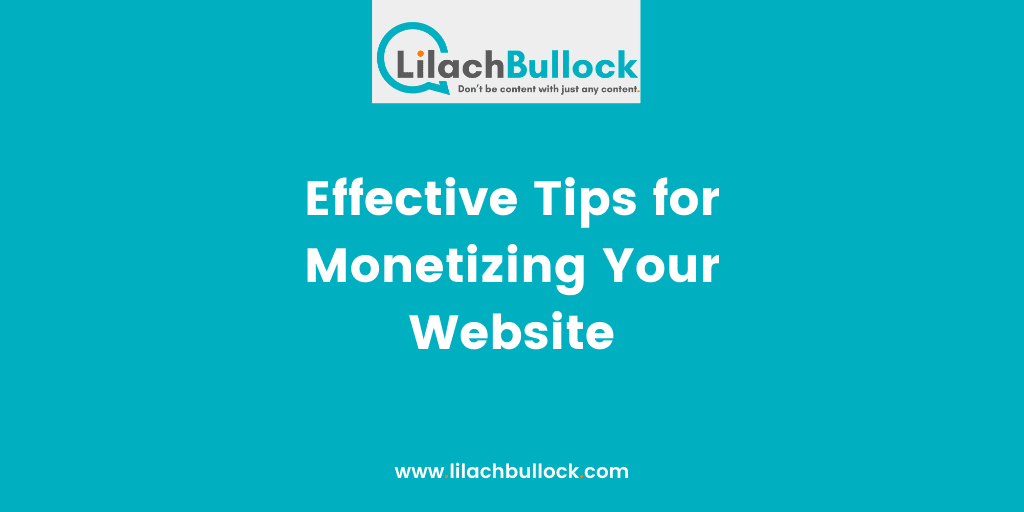Follow Lilach

Effective Tips for Monetizing Your Website
If you’ve been managing a blog for a while now, chances are you’re thinking of how you can make a profit with your content. Even if you’re just starting a blog, there are still ways you can ensure it’s equipped to generate revenue in the long run. Chances are, you’ve put plenty of thought and effort into your content marketing strategies. And optimizing your content for monetization can make your efforts worthwhile; with an additional source of income, you can continue building your blog and growing your readership.
However, before you start thinking of ways your blog can make money, it’s important that you understand high-quality content remain the core focus. Without great content, you’ll find that turning your blog into a money-making machine is pretty difficult. Once you’ve started to organically build an audience, use these tips to help you monetize your website:
Effective Tips for Monetizing Your Website
Affiliate Marketing
Affiliate marketing is the process of receiving a commission for recommending a product or service that a user purchases. This is a neat, natural way for you to earn some extra money with your website. Affiliate links are easily integrated into your content, and doesn’t disrupt the user experience. However, it’s important to understand that you should only recommend items that you know and trust—this means keeping affiliate links to a minimum. Rather than pad your content with affiliate links, be smart about how you use them. Otherwise, you could damage your credibility by pushing bad recommendations.
Premium Content / Membership
More and more publishers are transitioning into a paid content model. A report published by McKinsey & Company found that the subscription business model has doubled over the past five years, making it one of the biggest trends in the ecommerce world. Of course, there are pros and cons to adding a paywall to your site. On the one hand, you could lose a chunk of your readership. On the other, it’s a good way to differentiate yourself from other run-of-the-mill content producers and build more trust with your paying members.
Before you opt to go in this direction, it’s important that you know when to charge and when to wait. For example, new blogs would most likely fail at this strategy, unless you’re already an influencer with a large following.
It’s also important to understand that there are different paywall tiers. For example, you could create certain content that qualifies as “premium content.” These will likely be long-form and informative pieces that require additional payment, and is separate from the other free content you publish on your site. Always be sure the premium content you push is something your readers couldn’t find somewhere else.
Then, there’s the membership model. When it comes to semantics, the word “membership” can be more appealing than the word “subscription.” If you build in a feature for site membership, the benefits of signing up should be clear. Instead of a monthly membership, you should also consider the pros and cons of a one-time lifetime membership fee.
Sell E-books
Creating an e-book is a great way to monetize your platform. And the great thing about e-book development is that you already have plenty of content to work with. Instead of starting from scratch, you can sift through all your previous blog posts and re-purpose them with a fresh, in-depth take. No matter what industry, topics, or niche you cover, chances are there’s e-book creation opportunities for you. For example, if you write about travel, you could create an ebook on how to backpack on a budget the right away—there are endless creative options to choose from. Additionally, a little competitive research will go a long way here. Take a look at similar blogs to see how they’re using e-books to build their own audiences and make money.
Work With Sponsors
If your blog currently generates a decent amount of traffic, you could reach out to sponsors who are willing to pay you for sponsored ad spots on your blog. In most cases, sponsors reach out to blogs that cater to their audiences, but you can reverse engineer this process by pitching them directly.
Start by reaching out to potential sponsors about how you can begin a mutually beneficial working relationship. Create a “media kit” and sponsorship page to make it easier for potential sponsors to choose you. For example, you might dedicate a page of your site to detailing your site analytics, benefits for sponsors, and listing sponsorship packages. Creating a sponsorship page (put this page on your blog’s footer) also makes it easier for businesses to reach out to you and discover your blog through search engines.

Follow Lilach















